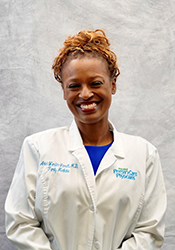Colorectal Cancer is Common But Can Be Prevented

A Q&A with Dr. Ariel Warden-Jarrett
Q: What is colorectal cancer?
A: Colorectal cancer, or colon cancer, occurs in the colon or rectum. The colon is the large intestine or large bowel. The rectum is the passageway that connects the colon to the anus. Most colon cancers develop first as polyps, which are abnormal growths that may later become cancerous.
Q: How common is colorectal cancer?
A: It is the third most common cancer diagnosed in both men and women in the U.S. and is the third leading cause of cancer-related deaths. It is expected to cause about 49,700 deaths this year.
Q: Who is at risk for colorectal cancer?
A: People of different ages, genders and races can get colorectal cancer. However, the Mayo Clinic lists several factors that may put you at higher risk:
- Age: Most people diagnosed with colorectal cancer are older than 50.
- Race: African-Americans have a greater risk than people of other races.
- Family history: You’re more likely to develop the cancer if you have a parent, sibling or child with the disease.
- Diet: People who eat diets low in fiber and high in fat and calories are at increased risk for colorectal cancer.
- Sedentary lifestyle: If you’re inactive and don’t exercise, you’re more likely to develop the cancer.
- Obesity: People who are obese are at increased risk. They are also more likely to die of the cancer.
- Bad habits: People who smoke cigarettes or drink heavily may increase their risk.
Q: What can I do to help prevent colorectal cancer?
A: Since lifestyle is linked to colorectal cancer, improving your diet and getting more exercise can help reduce your risk. Eat a diet rich in fruits, vegetables, and whole grains, and limit your intake of red meat and alcohol. And since obesity may increase your risk, it’s important to eat a diet that allows you to achieve a healthy body weight. Also, studies suggest that regular physical activity reduces the risk of colorectal cancer.
The good news is, when colorectal cancer is discovered early, it is highly treatable. The best way to do that is with a colonoscopy, a simple screening procedure that examines the inside of the colon and rectum, and removes polyps which may become cancerous. It is recommended you have a colonoscopy every 10 years starting at age 50 – at 45 for African-Americans ─ or every five years if you have a family history of colorectal cancer. Learn more about colonoscopies here.
If you’re under 50, make lifestyle changes now to reduce your risk. If you’re 50 or older, ask your doctor how to arrange a colonoscopy or any questions you have about colorectal cancer.
 Dr. Ariel Warden-Jarrett is an MPCP partner and sees patients in the Bowie office. She received her medical degree from George Washington University School of Medicine and Health Sciences and completed her residency program in Family Medicine at Howard University Hospital. She is certified by the American Board of Family Medicine.
Dr. Ariel Warden-Jarrett is an MPCP partner and sees patients in the Bowie office. She received her medical degree from George Washington University School of Medicine and Health Sciences and completed her residency program in Family Medicine at Howard University Hospital. She is certified by the American Board of Family Medicine.





